In 2019, we marked Elsoms’ 175th anniversary year. We have come a long way from our origins as a rope making company to establishing ourselves as the UK’s leading independent seed specialists, plant breeder and successful innovator in seed technology.
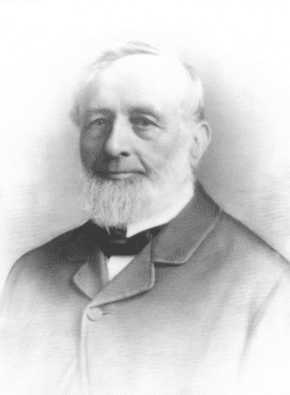 Isaac Elsom
Isaac Elsom1844
1844
Isaac Elsom establishes the company as a rope and twine maker at the Ropewalk, Spalding.
1863
Isaac and his family move from Pinchbeck Road to New
Road. This serves as both the family home and business
headquarters for the next 30 years.
1885
The name of the business changes from ‘Isaac Elsom, Rope
and Twine Manufacturer’ to ‘Elsom and Son, Rope and Yarn
Manufacturer, Sack and Seed Merchants’.
 The Ropewalk
The Ropewalk1886
At the age of 63, Isaac hands over the business to
his third son, George, aged 25
 George Elsom
George Elsom1887
George adds netting and covers to the range of
manufactured products at the Ropewalk
1894
Elsoms reaches its 50th year
1901
George dies of tuberculosis, aged 41, and his
eldest son, George, leaves school aged 14 to help
his mother run the business
1906
George, aged 20, takes
over full control of the
business
1910
The first Elsoms catalogue of vegetable and flower
seeds is produced
1918-19
Rope manufacturing ceases following the war.
Elsoms continues to trade in ropes and twines by
buying them in
1920s
Elsoms has an extensive root seed contracting
business with wholesale trade

George and his youngest brother, Bert, form a partnership and buy a warehouse to become a cereal processing plant
Always wanting to expand
beyond flower and vegetable
seed, George gradually adds
rootcrops, clovers and grasses
to the catalogue, followed by
cereals

1934 (above)
A row of houses on Broad Street,
bought by George and Bert, are
demolished and in December are
ready to use as the new
headquarters. Bert’s 13 year old son
officially opens the building, named
Elsom House
1930s
George and Bert set up the
English Sugar Beet Company
1939
Wheat stocks go on sale
and prove popular
1939
Wheat stocks go on sale and prove
popular

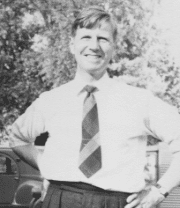 John Keeling
John Keeling1940s
Elsoms is still predominantly a family
business, however both George’s and
Bert’s sons had died and there was no
apparent family successor. George
contacts John Keeling, joint manager at
another seed company, to join Elsoms
instead of joining the forces – which the
Ministry of Agriculture agrees would be
in the national interest for him to do so
1943 (above)
Elsoms (Spalding) Limited is formally incorporated on December 4th 1943 and George, Bert and John hold equal shares
Florimond Desperez appoints Elsoms as his UK agent
 Florimond Desperez
Florimond Desperez1943
Work on a new warehouse starts on
Bert’s land, next to the cemetery on
Pinchbeck Road. It was later named
the Albert Warehouse, in memory of
Bert. A new cereal processing plant
is added later

1944
Elsoms reaches
its 100th year
1947
Bert suddenly
dies in November,
aged 54
1950s
Elsoms’ international reputation
is established. Much attention is focused
on cereals
The herbage department is building up a
significant export market, supplying to
France, Belgium and Germany
Elsoms’ maincrop onion seed is increasing
in popularity – which is the beginning of
what will become a major expansion of
Elsoms’ vegetable seed division


 George Elsom (second left)
George Elsom (second left)1952
Elsoms is awarded the World Rye
Championship, and on three
occasions in the next six years wins
the World Winter Wheat
Championship
George completes his 50th year with
the company

1954
HM The Queen Mother presents the ‘Best Stand’
award to George at the 1954 Norfolk Show
1957
George Elsom dies in April in the grounds
of Grimsthorpe Castle while visiting a
friend with his wife
George was a founder member of the
National Institute of Agricultural Botany
at Cambridge, and served on councils for
the UK Seed Trade Association and the
National Association of Corn and
Agricultural Merchants
 George Elsom
George ElsomJohn Keeling becomes Chairman and Managing Director. He sets up a policy committee and from then on there would be a concentration on seeds, excluding other aspects which Elsoms had been associated with
1960s
1960s
John aims to decentralise the company, wanting to look into a cheaper grade of seed to be processed where it was grown instead of being transported to Spalding. The scheme is an immediate success. To overcome the problem of growers not having their own machinery, John has the idea of a mobile cleaning plant where County Seed staff would travel to the localities with machinery
County Seeds is formed, a
subsidiary set up by Elsoms
to meet the demand for
cheaper cereal


1963
Elsoms vegetable division further
develops – after analysis of potential
markets, main programmes of Brussels
sprouts, onions and carrots start, with
secondary programmes
in beetroot and parsnip

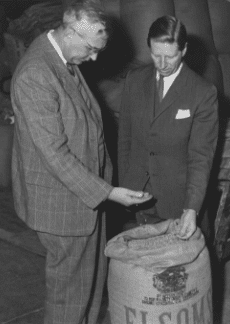 Joe Godber (Minister of Agriculture) and John Keeling
Joe Godber (Minister of Agriculture) and John Keeling Anthony Keeling (far right)
Anthony Keeling (far right)
1965
Anthony Keeling becomes a director
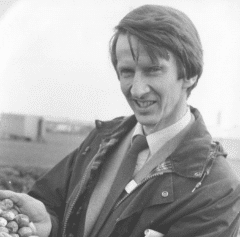 Anthony Keeling
Anthony Keeling1966
Elsoms forms a consortium, Unicorn Plant Breeders, a jointly owned company to coordinate cereal trials and plant breeding work

1968
A reorganised and enlarged
cleaning plant is completed
A warehouse is erected to provide a
new home for the vegetable
department. Subsequently, the
Ropewalk was closed, after more than
120 years since Isaac Elsom’s original
place of business
1969
Elsoms reaches its 125th year

1970s
Elsom House is closed and plans drawn up for a
new two-storey office block at Pinchbeck Road

1974
The new office block is ready for
occupation and later receives a
Spalding Civic Society award for its
simple and appropriate architecture
New computer systems are installed, to computerise all Elsoms’ orders, invoicing and sales records
 Anthony Keeling, Frank Nicholson, Victor Desprez and John Keeling
Anthony Keeling, Frank Nicholson, Victor Desprez and John Keeling
1970
Following the move to one site,
John Keeling remains as Company
Chairman with Anthony Keeling as
Managing Director
After more than a decade of
consolidating Elsoms’ sites, all the
separate aspects are now on a
single site

1980s
John Keeling dies, aged 71. The close and
effective working relationship between John
and Anthony enables a smooth transition
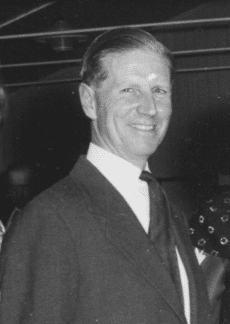 John Keeling
John KeelingElsoms agrees a long-term exclusive distribution arrangement with Bejo for outdoor vegetables, and also to work together on joint breeding programmes
As trade in vegetable seeds steadily
increases in importance, Elsoms begins
priming in large commercial quantities
for major outdoor vegetables
From approximately 1000 plots in 1960,
Elsoms’ trials and breeding extended to
around 100,000 plots
The Unicorn partnership is brought to a close
1983
Elsoms installs equipment to begin
production of treated seed and also
treat Bejo seed for UK distribution.
Within 3-4 years, the majority of UK
onions are being drilled from seed
treated by Elsoms
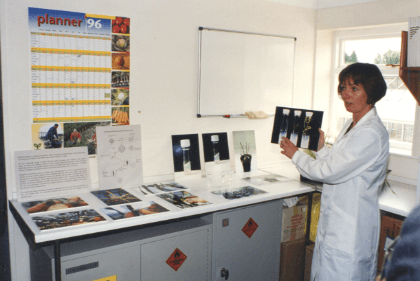 Sue Kennedy (Vegetable Breeding Technician)
Sue Kennedy (Vegetable Breeding Technician)1989
The lab is extended to permit more
sophisticated cereal testing and move
into vegetable anther culture
1994
Elsoms reaches its 150th year
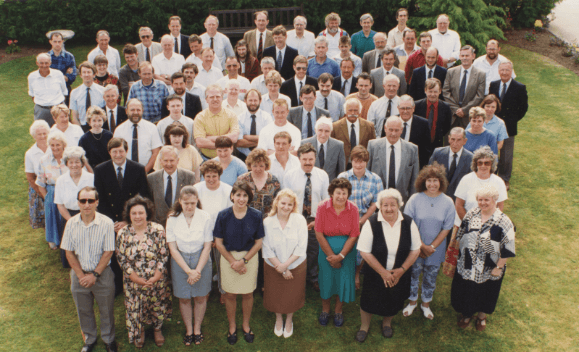 Elsoms staff together for a 150th anniversary photo
Elsoms staff together for a 150th anniversary photo1990s
In 1993 Elsoms receives accreditation to
BS5750 Part 2, and was one of the first major
seed companies to achieve this
Elsoms begins breeding purple sprouting
broccoli, which was later incorporated into a
joint breeding programme with Bejo

2000s
2006
Elsoms signs a licence with Incotec, becoming
partners in seed treatment and technology
2008
After more than 10 years of breeding hybrid
swede, the first varieties from the breeding
programme are marketed
2009
Roger Keeling, Anthony’s son,
becomes Chairman of Elsoms, with
Anthony as Deputy Chairman
 Anthony Keeling (front right), Rae Cook (later Head of Seed Treatment, centre) and Robin Wood (later Deputy Chairman, centre right)
Anthony Keeling (front right), Rae Cook (later Head of Seed Treatment, centre) and Robin Wood (later Deputy Chairman, centre right) Roger Keeling
Roger Keeling Stephen Smith (Head of Wheat Breeding, Elsoms Wheat)
Stephen Smith (Head of Wheat Breeding, Elsoms Wheat)2013
Elsoms Wheat is established as a joint venture between Elsoms, Nordsaat and ASUR Plant Breeding. The formation has tripled the size of Elsoms’ wheat breeding programme, allowing the breeding of robust wheat varieties for the UK
Elsoms begins to work closely with Saaten Union, making their specialist varieties available to UK farmers and growers
2017
Elsoms’ top selling oilseed rape
variety, Elgar, is added to the
AHDB recommended list
Elsoms Wheat’s first four varieties,
Dunston, Bennington, Freiston
and Moulton, are added to the
AHDB recommended list

2018
Elsoms Ackermann Barley is established, securing a foundation for the development of high-quality barley varieties for the UK

Elsoms Wheat’s next two
varieties, Elicit and Elation, are
added to the AHDB recommended list
 David Clay (Brassica Crop Manager)
David Clay (Brassica Crop Manager) David Coop (Research, Development and Marketing Director) and Mark Nightingale (Oilseed Rape Breeder and Technical Manager)
David Coop (Research, Development and Marketing Director) and Mark Nightingale (Oilseed Rape Breeder and Technical Manager)2019
Elsoms re-enters the oilseed rape
market with a new breeding programme
Elsoms and Bejo launch Burgundy, the
UK’s first purple wholehead broccoli
Elsoms reaches its 175th year


